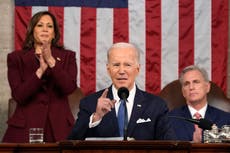Members of Congress are wearing special pins at the State of the Union – here’s why
Congressional Black Caucus members are wearing to protest police violence against Black Americans
Members of the Congressional Black Caucus (CBC) and a number of other Democrats attending the State of the Union address wore black pins with the year 1870 on them in reference to the year the first free, unarmed Black person was killed by a police officer.
The action by the CBC comes in the wake of the death of Tyre Nichols, a 29-year-old man who was brutally beaten by Memphis police officers following a traffic stop in early January. He died in a hospital three days later.
The beating outraged people across the United States and again produced calls for the country to meaningfully reform the institution of policing or reconsider how it concieves of public safety entirely.
The pins signal that plenty of Democratic members of Congress share the outrage that many in Memphis and beyond are feeling and are on board with the calls for, at a minimum, reform. The idea for the pins came from Rep Bonnie Watson Coleman of New Jersey, whose district contains the state capital of Trenton.
“I’m tired of moments of silence,” Ms Watson Coleman toldYahoo! News. “I’m tired of periods of mourning. I wanted to highlight that police killings of unarmed Black citizens have been in the news since 1870, and yet significant action has yet to be taken.”
On 31 March 1870, a 26-year-old Black man in Philadelphia was shot and killed by a white police officer named John Whiteside after he was accused of stealing something from a grocery store. Truman allegedly chased Whiteside into an alley before shooting him, and was later convicted of manslaughter.
Since then, there have been countless more episodes of police violence against Black people.

Black people are three times more likely than white people to be killed by police officers, five times as likely to be incarcerated in state prisons, and five times more likely to be stopped by police without case. Since 2017 alone, police have killed more than 1,300 Black people across the country.
“With the recent murder of Tyre Nichols, history has repeated itself once again — police kill an unarmed Black man, the nation mourns, and nothing changes,” a note attached to the button read. “We are tired of mourning and demand change.”
It is likely no coincidence that the first police killing of an unarmed Black person occured just after slavery was abolished by the Thirteenth Amendment in 1865, given that many experts believe that modern American policing evolved in part from slave patrols.
The families of Mr Nichols; Tamir Rice, the 12-year-old killed by Cleveland police in 2014; and Amir Locke, the 22-year-old killed by Minneapolis police last year; and the families of other victims of police violence were all in attendance at the Capitol, where Mr Biden dedicated a portion of his speech to grieving the death of Mr Nichols and calling for police and gun reform.
Join our commenting forum
Join thought-provoking conversations, follow other Independent readers and see their replies
Comments


Bookmark popover
Removed from bookmarks